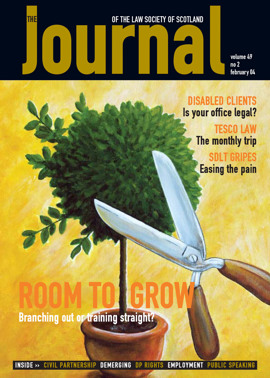It's a funny old world
Secrets and lies
Take a client’s right to confidentiality in their discussions with their solicitor – someone from whom they expect honesty and frankness – the norm in liberal democracies. Set that against 9/11, terrorism, drugs and money laundering which led to the Proceeds of Crime Act. Whilst the legislation should prevent solicitors being unwittingly used in a criminal act, and is intended to work in the public interest, many solicitors remain concerned that the public may be prejudiced by this legislation which requires a report to be made to the National Criminal Intelligence Service on suspicion and without informing the client. It’s hardly the stuff of confidentiality and frankness.
Some believe that the new law could prejudice law-abiding clients and their solicitors. Others believe that they will be protected from money-laundering rackets. Some say there is no difficulty in reporting attempts to involve a solicitor in criminal activity without their client knowing, others that this is Stalinist behaviour. So what is the score? 625 solicitors will find out at the Society’s now oversubscribed event on 12 March at the Moat House in Glasgow. I know the Journal is intending to report on the Prevention of Money Laundering conference, the advice it gives and the conclusions reached, particularly on how solicitors must protect their practice. It is set to be quite an event.
Protection or competition
The Solicitors (Scotland) Act established the Scottish Solicitors’ Guarantee Fund, resourced by solicitors to repay anyone who has suffered financial loss because of a solicitor’s dishonesty. It’s a client protection which is second to none, yet if the trend for deregulation sweeps north into Scotland, this consumer safety-net might decrease or disappear altogether – under competition law designed to protect the consumer. This, let me remind you, is the system that jurisdictions across the world have admired and copied.
Then we have the Master Policy for Professional Indemnity Insurance, established in the 1970s to ensure that clients who suffered loss through any professional negligence by a solicitor would have their awards paid. OFT are investigating whether the policy complies with competition law on the basis that if it does not, it cannot possibly be in the interest of the consumer and the policy may have to go. This is of course the policy designed to ensure that solicitors have the right indemnity and clients the knowledge that their solicitor could be fruitfully sued for negligence.
Referral fees is another area where Scotland has sought to protect clients from touting which can threaten the independence of the solicitor. The English profession have decided to allow referral fees, under pressure I suspect, rather than positive motivation. So there goes another consumer protection, with the assistance of the OFT and the Competition Commission.
Or perhaps the OFT and the Competition Commission are right. Although the Clementi review is only of the profession in England and Wales, perhaps we should seize it as the way to shed professional constraints and obligations on the basis that the provision of legal services should become a simple economic or trading activity.
Perhaps the Guarantee Fund, Master Policy and any obligation to put the client first should cease on the basis that, to be truly competitive, legal services must be like any other industry and have profit as its only driving force. If that happens then the profession might make more money but clients will lose their consumer protections, along with the protection of their interests.
Who will pay this time?
Concern continues on stamp duty land tax. Forms are not being returned timeously by the Inland Revenue. Despite the Society having told the Revenue – and told them, and told them – it seems inevitable that some time before long, sellers will be sequestrated and purchasers will lose their home before the Revenue have stamped the right form. Yet the Revenue insist on their money up front so that no receiver or floating charge can affect their dues. The Revenue must at least announce that they will indemnify anyone who loses their property because the SDLT form was not returned in time. I would urge you to write to Stuart Drummond, the Secretary of the Tax Law Committee at the Society to find out why the Revenue has paid such disregard to the Scottish system in spite of the efforts of the Society and so many other concerned organisations and individuals north of the border.
Consumer interest or letdown
The Society has been consistent and successful in working to protect clients, yet a variety of bodies which are supposedly there to protect consumers seem set to achieve the opposite and let down the very people they set out to protect. It really is a funny old world!
In this issue
- It's a funny old world
- Making the ends of justice meet
- Training for growth
- All the grocer's grandchildren
- Radical change or a lie in law?
- Costing the job
- Are you listening?
- Much ado about nothing?
- Demergers and continuing cover
- Bond with the audience
- Many roles, one team
- Fee sharing: making the rules work
- On sentencing
- Credit reform by instalments
- Scottish Solicitors' Discipline Tribunal
- Show us the evidence!
- A new era for farm tenancy law
- Fathers' rights: a new UK postcode lottery?
- Parallel imports: putting on the brakes
- Website reviews
- Book reviews
- SDLT 1: Over the obstacle course
- SDLT 2: Personal presentation
- The new law of real burdens
- Housing Improvement Task Force






